Mental Health and Illness: Causes of Depression and Approaches for Treatment
VerifiedAdded on 2023/06/10
|7
|2046
|298
AI Summary
This article discusses the difficulties in defining normality and abnormality in mental health, and explains the causes of depression from different psychological perspectives such as medical, psycho-dynamic, behaviorists, cognitive and humanistic theories. It also explores different approaches for treating depression from different psychological perspectives, including cognitive behavior therapy, interpersonal therapy, behavior therapy, and mindfulness-based cognitive therapy.
Contribute Materials
Your contribution can guide someone’s learning journey. Share your
documents today.

Mental Health and Illness
Secure Best Marks with AI Grader
Need help grading? Try our AI Grader for instant feedback on your assignments.
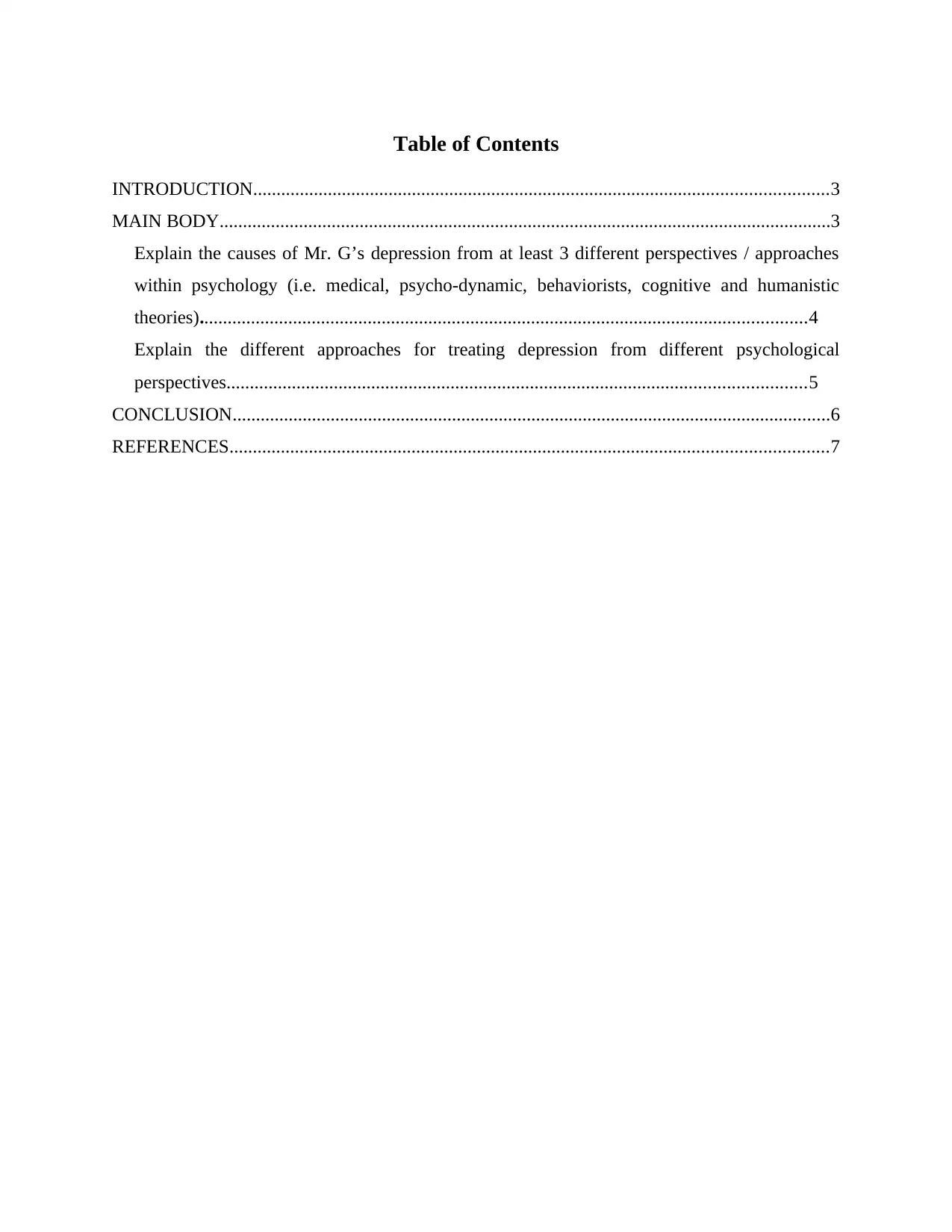
Table of Contents
INTRODUCTION...........................................................................................................................3
MAIN BODY...................................................................................................................................3
Explain the causes of Mr. G’s depression from at least 3 different perspectives / approaches
within psychology (i.e. medical, psycho-dynamic, behaviorists, cognitive and humanistic
theories)..................................................................................................................................4
Explain the different approaches for treating depression from different psychological
perspectives............................................................................................................................5
CONCLUSION................................................................................................................................6
REFERENCES................................................................................................................................7
INTRODUCTION...........................................................................................................................3
MAIN BODY...................................................................................................................................3
Explain the causes of Mr. G’s depression from at least 3 different perspectives / approaches
within psychology (i.e. medical, psycho-dynamic, behaviorists, cognitive and humanistic
theories)..................................................................................................................................4
Explain the different approaches for treating depression from different psychological
perspectives............................................................................................................................5
CONCLUSION................................................................................................................................6
REFERENCES................................................................................................................................7
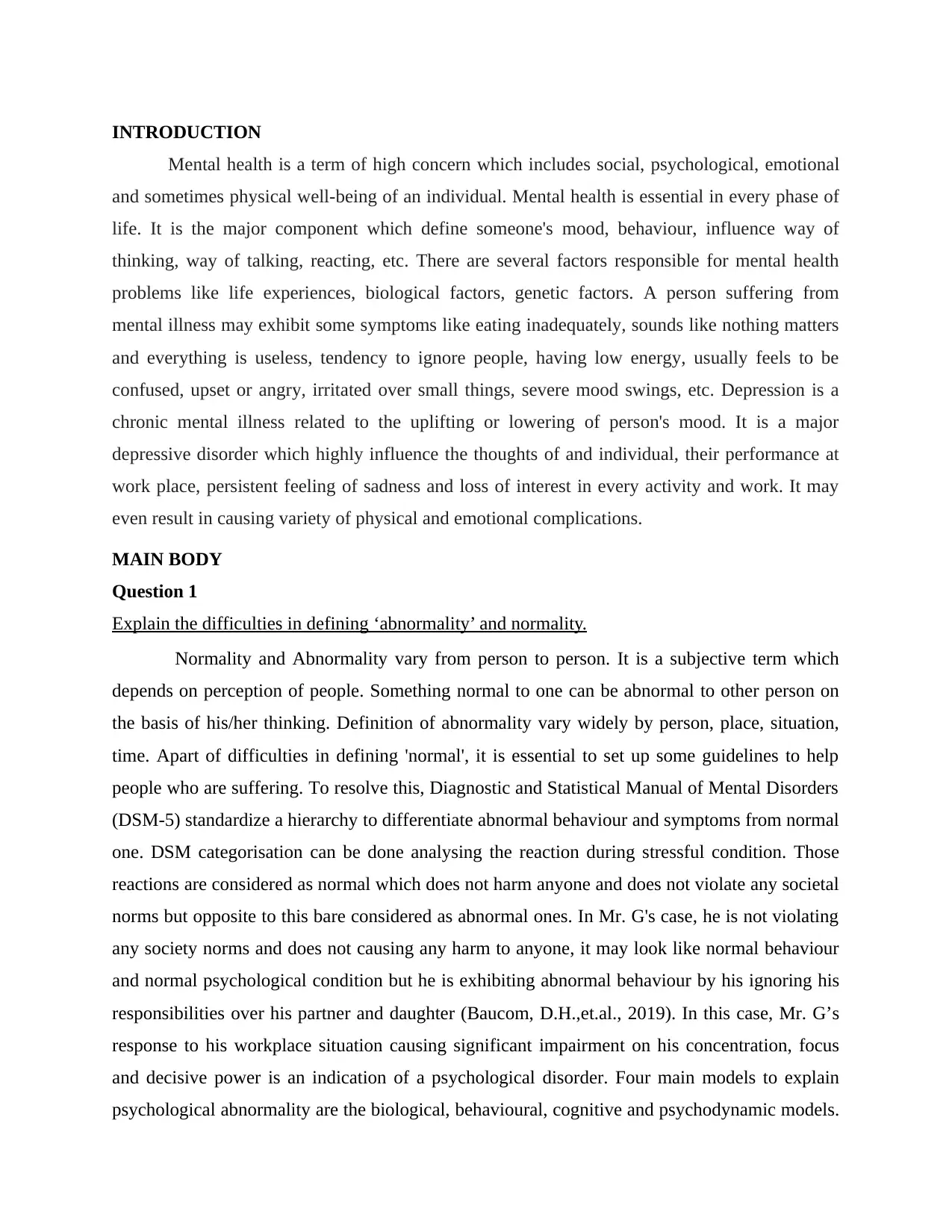
INTRODUCTION
Mental health is a term of high concern which includes social, psychological, emotional
and sometimes physical well-being of an individual. Mental health is essential in every phase of
life. It is the major component which define someone's mood, behaviour, influence way of
thinking, way of talking, reacting, etc. There are several factors responsible for mental health
problems like life experiences, biological factors, genetic factors. A person suffering from
mental illness may exhibit some symptoms like eating inadequately, sounds like nothing matters
and everything is useless, tendency to ignore people, having low energy, usually feels to be
confused, upset or angry, irritated over small things, severe mood swings, etc. Depression is a
chronic mental illness related to the uplifting or lowering of person's mood. It is a major
depressive disorder which highly influence the thoughts of and individual, their performance at
work place, persistent feeling of sadness and loss of interest in every activity and work. It may
even result in causing variety of physical and emotional complications.
MAIN BODY
Question 1
Explain the difficulties in defining ‘abnormality’ and normality.
Normality and Abnormality vary from person to person. It is a subjective term which
depends on perception of people. Something normal to one can be abnormal to other person on
the basis of his/her thinking. Definition of abnormality vary widely by person, place, situation,
time. Apart of difficulties in defining 'normal', it is essential to set up some guidelines to help
people who are suffering. To resolve this, Diagnostic and Statistical Manual of Mental Disorders
(DSM-5) standardize a hierarchy to differentiate abnormal behaviour and symptoms from normal
one. DSM categorisation can be done analysing the reaction during stressful condition. Those
reactions are considered as normal which does not harm anyone and does not violate any societal
norms but opposite to this bare considered as abnormal ones. In Mr. G's case, he is not violating
any society norms and does not causing any harm to anyone, it may look like normal behaviour
and normal psychological condition but he is exhibiting abnormal behaviour by his ignoring his
responsibilities over his partner and daughter (Baucom, D.H.,et.al., 2019). In this case, Mr. G’s
response to his workplace situation causing significant impairment on his concentration, focus
and decisive power is an indication of a psychological disorder. Four main models to explain
psychological abnormality are the biological, behavioural, cognitive and psychodynamic models.
Mental health is a term of high concern which includes social, psychological, emotional
and sometimes physical well-being of an individual. Mental health is essential in every phase of
life. It is the major component which define someone's mood, behaviour, influence way of
thinking, way of talking, reacting, etc. There are several factors responsible for mental health
problems like life experiences, biological factors, genetic factors. A person suffering from
mental illness may exhibit some symptoms like eating inadequately, sounds like nothing matters
and everything is useless, tendency to ignore people, having low energy, usually feels to be
confused, upset or angry, irritated over small things, severe mood swings, etc. Depression is a
chronic mental illness related to the uplifting or lowering of person's mood. It is a major
depressive disorder which highly influence the thoughts of and individual, their performance at
work place, persistent feeling of sadness and loss of interest in every activity and work. It may
even result in causing variety of physical and emotional complications.
MAIN BODY
Question 1
Explain the difficulties in defining ‘abnormality’ and normality.
Normality and Abnormality vary from person to person. It is a subjective term which
depends on perception of people. Something normal to one can be abnormal to other person on
the basis of his/her thinking. Definition of abnormality vary widely by person, place, situation,
time. Apart of difficulties in defining 'normal', it is essential to set up some guidelines to help
people who are suffering. To resolve this, Diagnostic and Statistical Manual of Mental Disorders
(DSM-5) standardize a hierarchy to differentiate abnormal behaviour and symptoms from normal
one. DSM categorisation can be done analysing the reaction during stressful condition. Those
reactions are considered as normal which does not harm anyone and does not violate any societal
norms but opposite to this bare considered as abnormal ones. In Mr. G's case, he is not violating
any society norms and does not causing any harm to anyone, it may look like normal behaviour
and normal psychological condition but he is exhibiting abnormal behaviour by his ignoring his
responsibilities over his partner and daughter (Baucom, D.H.,et.al., 2019). In this case, Mr. G’s
response to his workplace situation causing significant impairment on his concentration, focus
and decisive power is an indication of a psychological disorder. Four main models to explain
psychological abnormality are the biological, behavioural, cognitive and psychodynamic models.
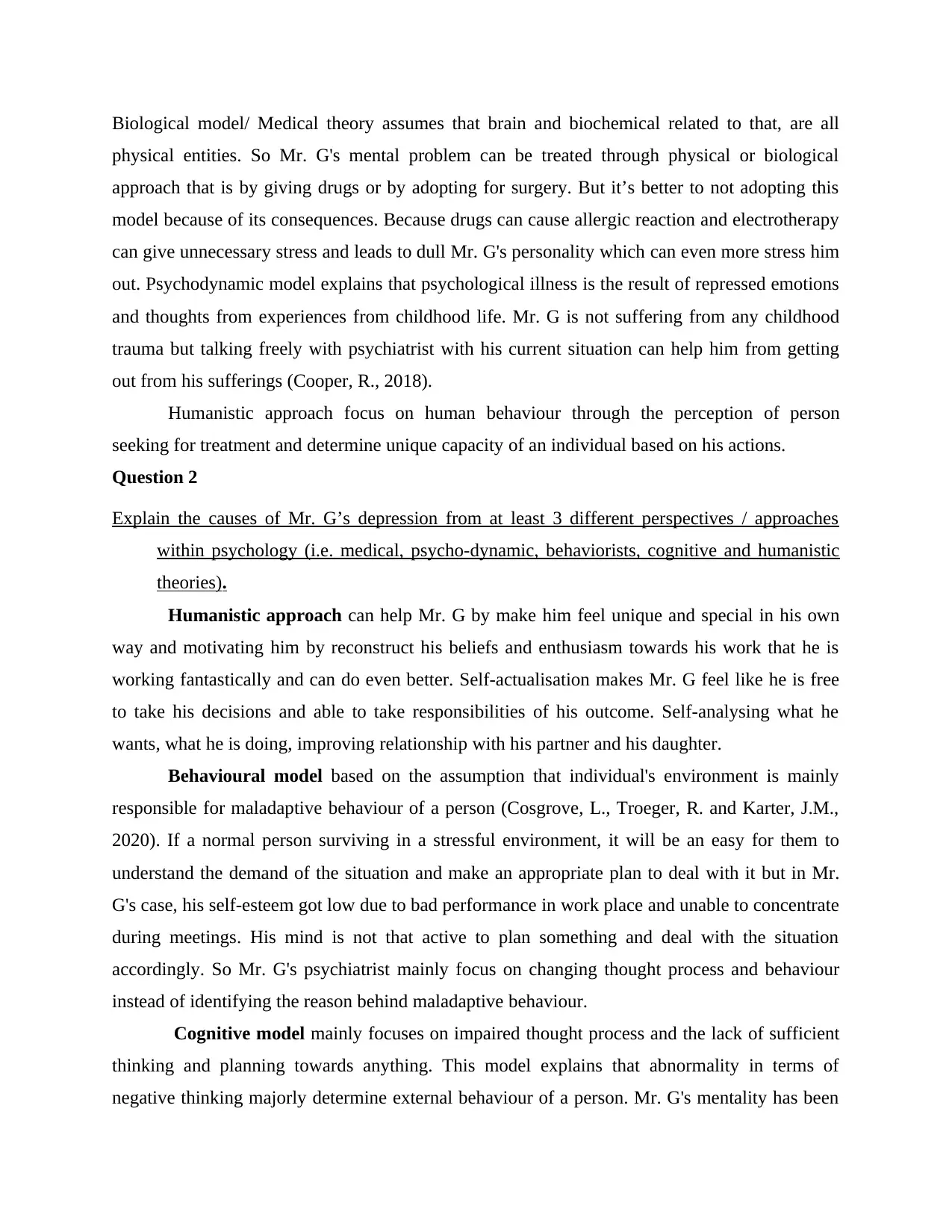
Biological model/ Medical theory assumes that brain and biochemical related to that, are all
physical entities. So Mr. G's mental problem can be treated through physical or biological
approach that is by giving drugs or by adopting for surgery. But it’s better to not adopting this
model because of its consequences. Because drugs can cause allergic reaction and electrotherapy
can give unnecessary stress and leads to dull Mr. G's personality which can even more stress him
out. Psychodynamic model explains that psychological illness is the result of repressed emotions
and thoughts from experiences from childhood life. Mr. G is not suffering from any childhood
trauma but talking freely with psychiatrist with his current situation can help him from getting
out from his sufferings (Cooper, R., 2018).
Humanistic approach focus on human behaviour through the perception of person
seeking for treatment and determine unique capacity of an individual based on his actions.
Question 2
Explain the causes of Mr. G’s depression from at least 3 different perspectives / approaches
within psychology (i.e. medical, psycho-dynamic, behaviorists, cognitive and humanistic
theories).
Humanistic approach can help Mr. G by make him feel unique and special in his own
way and motivating him by reconstruct his beliefs and enthusiasm towards his work that he is
working fantastically and can do even better. Self-actualisation makes Mr. G feel like he is free
to take his decisions and able to take responsibilities of his outcome. Self-analysing what he
wants, what he is doing, improving relationship with his partner and his daughter.
Behavioural model based on the assumption that individual's environment is mainly
responsible for maladaptive behaviour of a person (Cosgrove, L., Troeger, R. and Karter, J.M.,
2020). If a normal person surviving in a stressful environment, it will be an easy for them to
understand the demand of the situation and make an appropriate plan to deal with it but in Mr.
G's case, his self-esteem got low due to bad performance in work place and unable to concentrate
during meetings. His mind is not that active to plan something and deal with the situation
accordingly. So Mr. G's psychiatrist mainly focus on changing thought process and behaviour
instead of identifying the reason behind maladaptive behaviour.
Cognitive model mainly focuses on impaired thought process and the lack of sufficient
thinking and planning towards anything. This model explains that abnormality in terms of
negative thinking majorly determine external behaviour of a person. Mr. G's mentality has been
physical entities. So Mr. G's mental problem can be treated through physical or biological
approach that is by giving drugs or by adopting for surgery. But it’s better to not adopting this
model because of its consequences. Because drugs can cause allergic reaction and electrotherapy
can give unnecessary stress and leads to dull Mr. G's personality which can even more stress him
out. Psychodynamic model explains that psychological illness is the result of repressed emotions
and thoughts from experiences from childhood life. Mr. G is not suffering from any childhood
trauma but talking freely with psychiatrist with his current situation can help him from getting
out from his sufferings (Cooper, R., 2018).
Humanistic approach focus on human behaviour through the perception of person
seeking for treatment and determine unique capacity of an individual based on his actions.
Question 2
Explain the causes of Mr. G’s depression from at least 3 different perspectives / approaches
within psychology (i.e. medical, psycho-dynamic, behaviorists, cognitive and humanistic
theories).
Humanistic approach can help Mr. G by make him feel unique and special in his own
way and motivating him by reconstruct his beliefs and enthusiasm towards his work that he is
working fantastically and can do even better. Self-actualisation makes Mr. G feel like he is free
to take his decisions and able to take responsibilities of his outcome. Self-analysing what he
wants, what he is doing, improving relationship with his partner and his daughter.
Behavioural model based on the assumption that individual's environment is mainly
responsible for maladaptive behaviour of a person (Cosgrove, L., Troeger, R. and Karter, J.M.,
2020). If a normal person surviving in a stressful environment, it will be an easy for them to
understand the demand of the situation and make an appropriate plan to deal with it but in Mr.
G's case, his self-esteem got low due to bad performance in work place and unable to concentrate
during meetings. His mind is not that active to plan something and deal with the situation
accordingly. So Mr. G's psychiatrist mainly focus on changing thought process and behaviour
instead of identifying the reason behind maladaptive behaviour.
Cognitive model mainly focuses on impaired thought process and the lack of sufficient
thinking and planning towards anything. This model explains that abnormality in terms of
negative thinking majorly determine external behaviour of a person. Mr. G's mentality has been
Secure Best Marks with AI Grader
Need help grading? Try our AI Grader for instant feedback on your assignments.
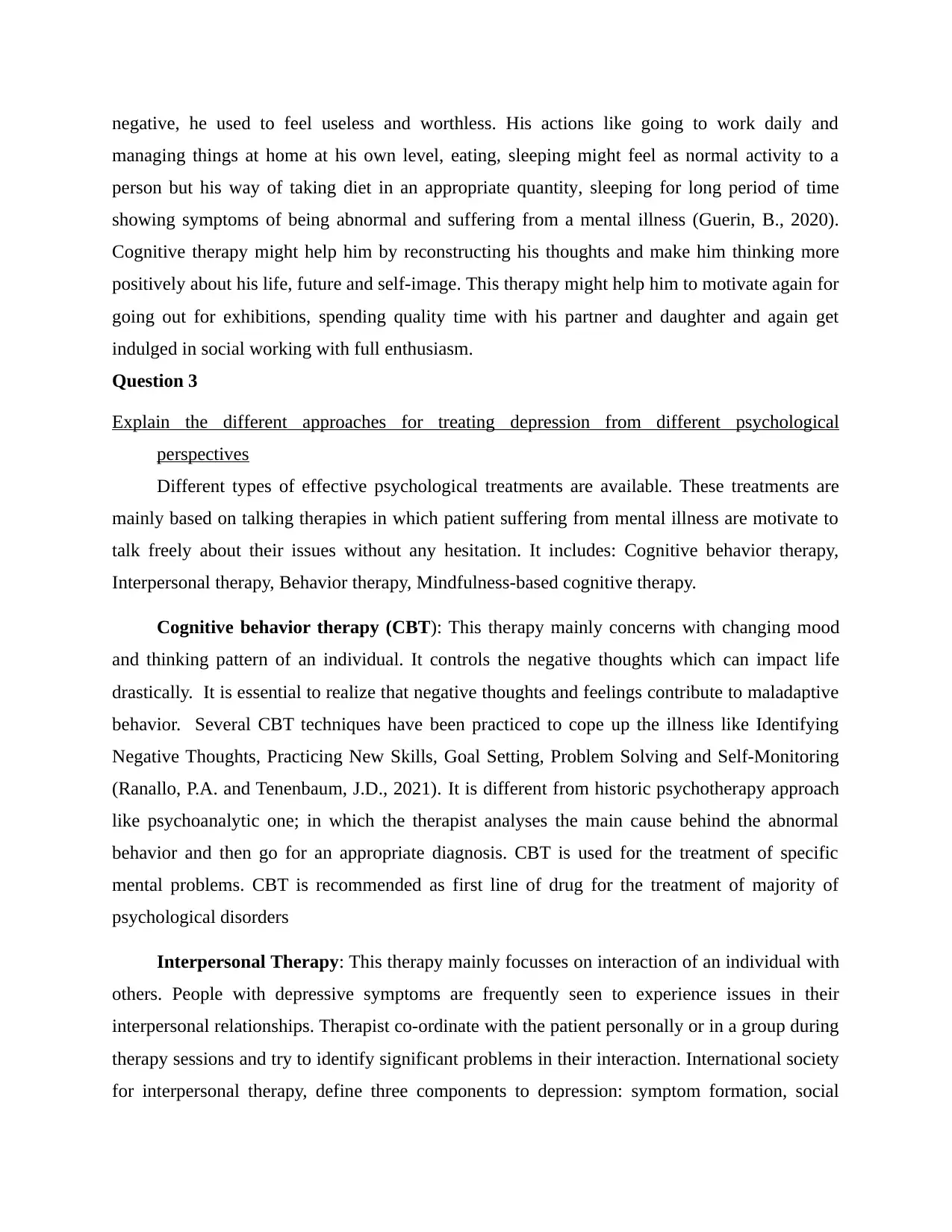
negative, he used to feel useless and worthless. His actions like going to work daily and
managing things at home at his own level, eating, sleeping might feel as normal activity to a
person but his way of taking diet in an appropriate quantity, sleeping for long period of time
showing symptoms of being abnormal and suffering from a mental illness (Guerin, B., 2020).
Cognitive therapy might help him by reconstructing his thoughts and make him thinking more
positively about his life, future and self-image. This therapy might help him to motivate again for
going out for exhibitions, spending quality time with his partner and daughter and again get
indulged in social working with full enthusiasm.
Question 3
Explain the different approaches for treating depression from different psychological
perspectives
Different types of effective psychological treatments are available. These treatments are
mainly based on talking therapies in which patient suffering from mental illness are motivate to
talk freely about their issues without any hesitation. It includes: Cognitive behavior therapy,
Interpersonal therapy, Behavior therapy, Mindfulness-based cognitive therapy.
Cognitive behavior therapy (CBT): This therapy mainly concerns with changing mood
and thinking pattern of an individual. It controls the negative thoughts which can impact life
drastically. It is essential to realize that negative thoughts and feelings contribute to maladaptive
behavior. Several CBT techniques have been practiced to cope up the illness like Identifying
Negative Thoughts, Practicing New Skills, Goal Setting, Problem Solving and Self-Monitoring
(Ranallo, P.A. and Tenenbaum, J.D., 2021). It is different from historic psychotherapy approach
like psychoanalytic one; in which the therapist analyses the main cause behind the abnormal
behavior and then go for an appropriate diagnosis. CBT is used for the treatment of specific
mental problems. CBT is recommended as first line of drug for the treatment of majority of
psychological disorders
Interpersonal Therapy: This therapy mainly focusses on interaction of an individual with
others. People with depressive symptoms are frequently seen to experience issues in their
interpersonal relationships. Therapist co-ordinate with the patient personally or in a group during
therapy sessions and try to identify significant problems in their interaction. International society
for interpersonal therapy, define three components to depression: symptom formation, social
managing things at home at his own level, eating, sleeping might feel as normal activity to a
person but his way of taking diet in an appropriate quantity, sleeping for long period of time
showing symptoms of being abnormal and suffering from a mental illness (Guerin, B., 2020).
Cognitive therapy might help him by reconstructing his thoughts and make him thinking more
positively about his life, future and self-image. This therapy might help him to motivate again for
going out for exhibitions, spending quality time with his partner and daughter and again get
indulged in social working with full enthusiasm.
Question 3
Explain the different approaches for treating depression from different psychological
perspectives
Different types of effective psychological treatments are available. These treatments are
mainly based on talking therapies in which patient suffering from mental illness are motivate to
talk freely about their issues without any hesitation. It includes: Cognitive behavior therapy,
Interpersonal therapy, Behavior therapy, Mindfulness-based cognitive therapy.
Cognitive behavior therapy (CBT): This therapy mainly concerns with changing mood
and thinking pattern of an individual. It controls the negative thoughts which can impact life
drastically. It is essential to realize that negative thoughts and feelings contribute to maladaptive
behavior. Several CBT techniques have been practiced to cope up the illness like Identifying
Negative Thoughts, Practicing New Skills, Goal Setting, Problem Solving and Self-Monitoring
(Ranallo, P.A. and Tenenbaum, J.D., 2021). It is different from historic psychotherapy approach
like psychoanalytic one; in which the therapist analyses the main cause behind the abnormal
behavior and then go for an appropriate diagnosis. CBT is used for the treatment of specific
mental problems. CBT is recommended as first line of drug for the treatment of majority of
psychological disorders
Interpersonal Therapy: This therapy mainly focusses on interaction of an individual with
others. People with depressive symptoms are frequently seen to experience issues in their
interpersonal relationships. Therapist co-ordinate with the patient personally or in a group during
therapy sessions and try to identify significant problems in their interaction. International society
for interpersonal therapy, define three components to depression: symptom formation, social
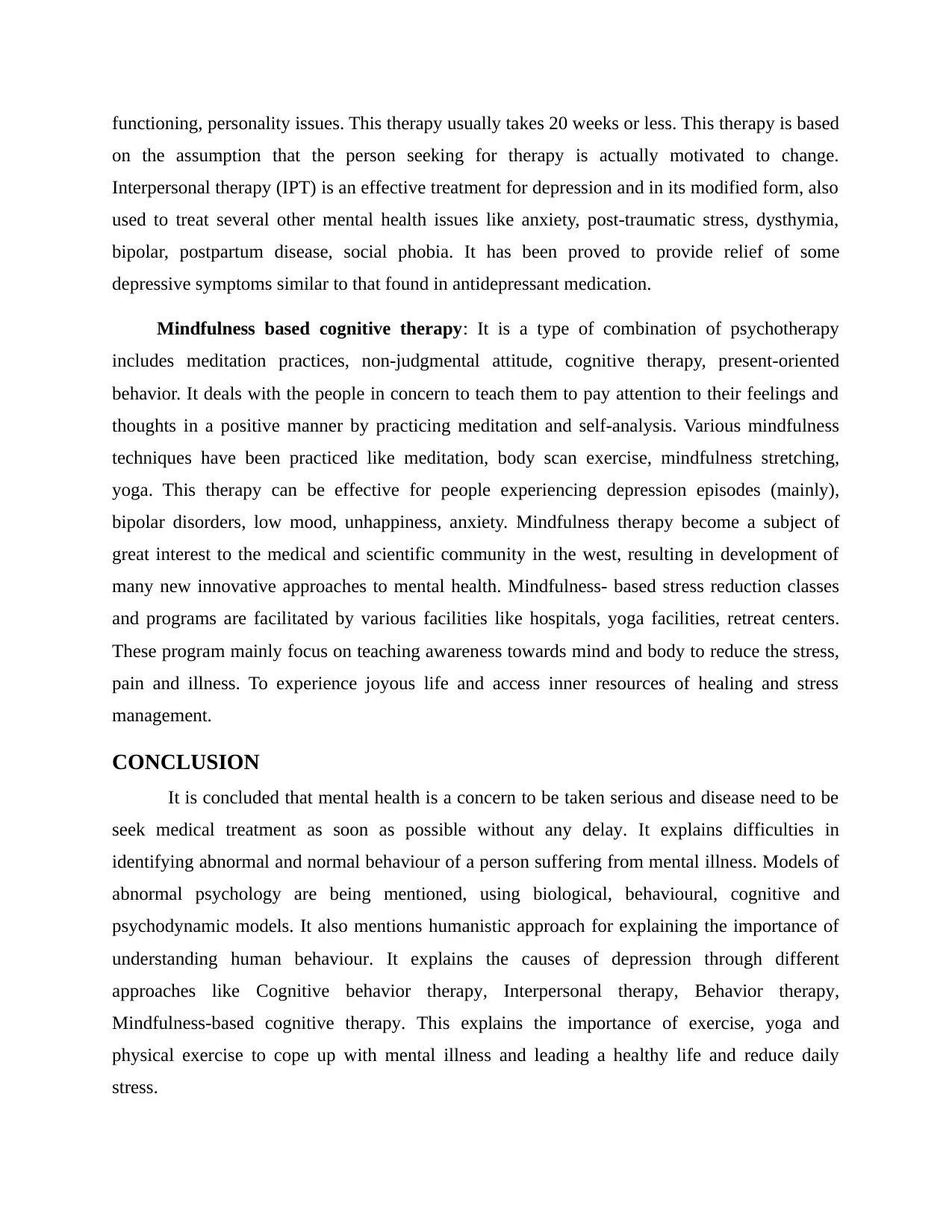
functioning, personality issues. This therapy usually takes 20 weeks or less. This therapy is based
on the assumption that the person seeking for therapy is actually motivated to change.
Interpersonal therapy (IPT) is an effective treatment for depression and in its modified form, also
used to treat several other mental health issues like anxiety, post-traumatic stress, dysthymia,
bipolar, postpartum disease, social phobia. It has been proved to provide relief of some
depressive symptoms similar to that found in antidepressant medication.
Mindfulness based cognitive therapy: It is a type of combination of psychotherapy
includes meditation practices, non-judgmental attitude, cognitive therapy, present-oriented
behavior. It deals with the people in concern to teach them to pay attention to their feelings and
thoughts in a positive manner by practicing meditation and self-analysis. Various mindfulness
techniques have been practiced like meditation, body scan exercise, mindfulness stretching,
yoga. This therapy can be effective for people experiencing depression episodes (mainly),
bipolar disorders, low mood, unhappiness, anxiety. Mindfulness therapy become a subject of
great interest to the medical and scientific community in the west, resulting in development of
many new innovative approaches to mental health. Mindfulness- based stress reduction classes
and programs are facilitated by various facilities like hospitals, yoga facilities, retreat centers.
These program mainly focus on teaching awareness towards mind and body to reduce the stress,
pain and illness. To experience joyous life and access inner resources of healing and stress
management.
CONCLUSION
It is concluded that mental health is a concern to be taken serious and disease need to be
seek medical treatment as soon as possible without any delay. It explains difficulties in
identifying abnormal and normal behaviour of a person suffering from mental illness. Models of
abnormal psychology are being mentioned, using biological, behavioural, cognitive and
psychodynamic models. It also mentions humanistic approach for explaining the importance of
understanding human behaviour. It explains the causes of depression through different
approaches like Cognitive behavior therapy, Interpersonal therapy, Behavior therapy,
Mindfulness-based cognitive therapy. This explains the importance of exercise, yoga and
physical exercise to cope up with mental illness and leading a healthy life and reduce daily
stress.
on the assumption that the person seeking for therapy is actually motivated to change.
Interpersonal therapy (IPT) is an effective treatment for depression and in its modified form, also
used to treat several other mental health issues like anxiety, post-traumatic stress, dysthymia,
bipolar, postpartum disease, social phobia. It has been proved to provide relief of some
depressive symptoms similar to that found in antidepressant medication.
Mindfulness based cognitive therapy: It is a type of combination of psychotherapy
includes meditation practices, non-judgmental attitude, cognitive therapy, present-oriented
behavior. It deals with the people in concern to teach them to pay attention to their feelings and
thoughts in a positive manner by practicing meditation and self-analysis. Various mindfulness
techniques have been practiced like meditation, body scan exercise, mindfulness stretching,
yoga. This therapy can be effective for people experiencing depression episodes (mainly),
bipolar disorders, low mood, unhappiness, anxiety. Mindfulness therapy become a subject of
great interest to the medical and scientific community in the west, resulting in development of
many new innovative approaches to mental health. Mindfulness- based stress reduction classes
and programs are facilitated by various facilities like hospitals, yoga facilities, retreat centers.
These program mainly focus on teaching awareness towards mind and body to reduce the stress,
pain and illness. To experience joyous life and access inner resources of healing and stress
management.
CONCLUSION
It is concluded that mental health is a concern to be taken serious and disease need to be
seek medical treatment as soon as possible without any delay. It explains difficulties in
identifying abnormal and normal behaviour of a person suffering from mental illness. Models of
abnormal psychology are being mentioned, using biological, behavioural, cognitive and
psychodynamic models. It also mentions humanistic approach for explaining the importance of
understanding human behaviour. It explains the causes of depression through different
approaches like Cognitive behavior therapy, Interpersonal therapy, Behavior therapy,
Mindfulness-based cognitive therapy. This explains the importance of exercise, yoga and
physical exercise to cope up with mental illness and leading a healthy life and reduce daily
stress.
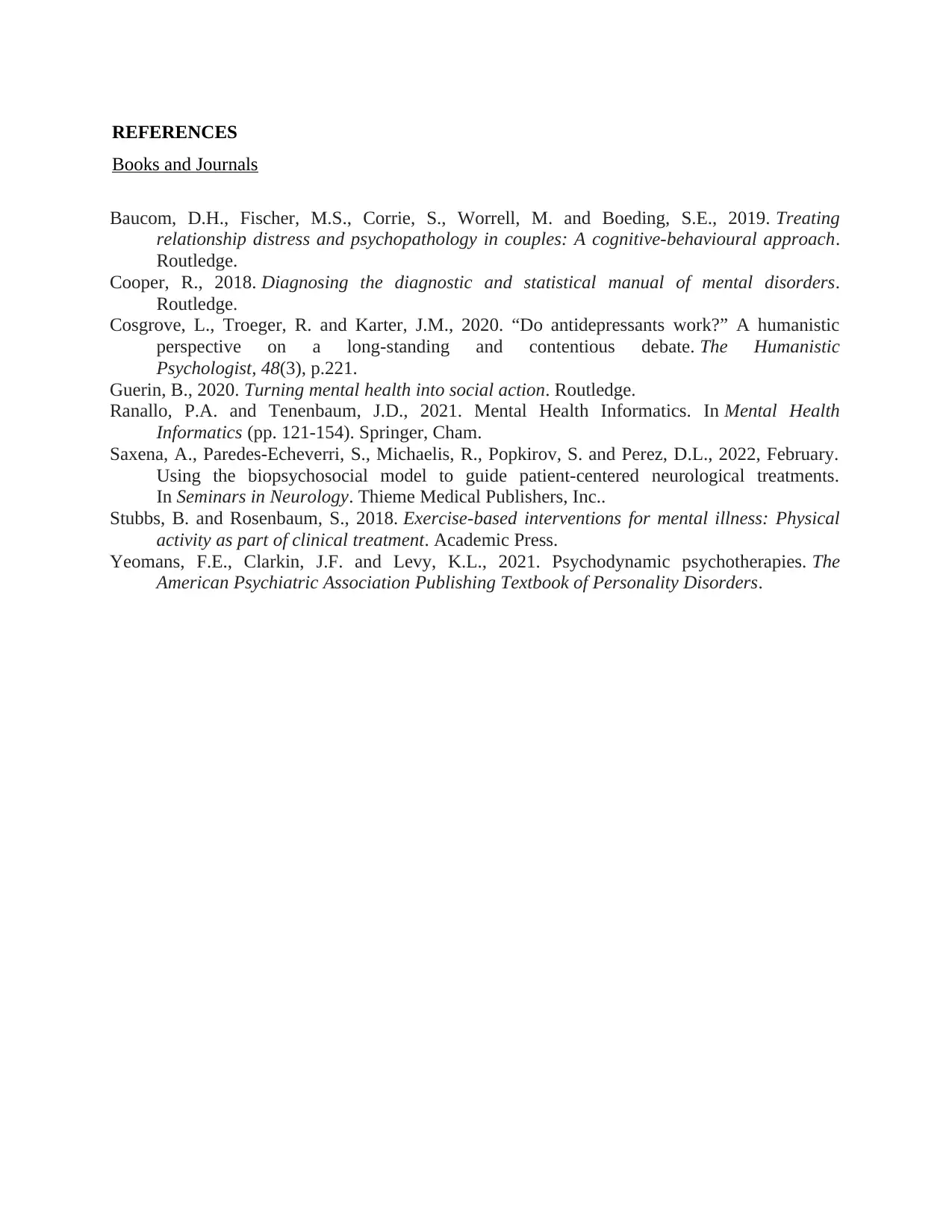
REFERENCES
Books and Journals
Baucom, D.H., Fischer, M.S., Corrie, S., Worrell, M. and Boeding, S.E., 2019. Treating
relationship distress and psychopathology in couples: A cognitive-behavioural approach.
Routledge.
Cooper, R., 2018. Diagnosing the diagnostic and statistical manual of mental disorders.
Routledge.
Cosgrove, L., Troeger, R. and Karter, J.M., 2020. “Do antidepressants work?” A humanistic
perspective on a long-standing and contentious debate. The Humanistic
Psychologist, 48(3), p.221.
Guerin, B., 2020. Turning mental health into social action. Routledge.
Ranallo, P.A. and Tenenbaum, J.D., 2021. Mental Health Informatics. In Mental Health
Informatics (pp. 121-154). Springer, Cham.
Saxena, A., Paredes-Echeverri, S., Michaelis, R., Popkirov, S. and Perez, D.L., 2022, February.
Using the biopsychosocial model to guide patient-centered neurological treatments.
In Seminars in Neurology. Thieme Medical Publishers, Inc..
Stubbs, B. and Rosenbaum, S., 2018. Exercise-based interventions for mental illness: Physical
activity as part of clinical treatment. Academic Press.
Yeomans, F.E., Clarkin, J.F. and Levy, K.L., 2021. Psychodynamic psychotherapies. The
American Psychiatric Association Publishing Textbook of Personality Disorders.
Books and Journals
Baucom, D.H., Fischer, M.S., Corrie, S., Worrell, M. and Boeding, S.E., 2019. Treating
relationship distress and psychopathology in couples: A cognitive-behavioural approach.
Routledge.
Cooper, R., 2018. Diagnosing the diagnostic and statistical manual of mental disorders.
Routledge.
Cosgrove, L., Troeger, R. and Karter, J.M., 2020. “Do antidepressants work?” A humanistic
perspective on a long-standing and contentious debate. The Humanistic
Psychologist, 48(3), p.221.
Guerin, B., 2020. Turning mental health into social action. Routledge.
Ranallo, P.A. and Tenenbaum, J.D., 2021. Mental Health Informatics. In Mental Health
Informatics (pp. 121-154). Springer, Cham.
Saxena, A., Paredes-Echeverri, S., Michaelis, R., Popkirov, S. and Perez, D.L., 2022, February.
Using the biopsychosocial model to guide patient-centered neurological treatments.
In Seminars in Neurology. Thieme Medical Publishers, Inc..
Stubbs, B. and Rosenbaum, S., 2018. Exercise-based interventions for mental illness: Physical
activity as part of clinical treatment. Academic Press.
Yeomans, F.E., Clarkin, J.F. and Levy, K.L., 2021. Psychodynamic psychotherapies. The
American Psychiatric Association Publishing Textbook of Personality Disorders.
1 out of 7
Related Documents
Your All-in-One AI-Powered Toolkit for Academic Success.
+13062052269
info@desklib.com
Available 24*7 on WhatsApp / Email
![[object Object]](/_next/static/media/star-bottom.7253800d.svg)
Unlock your academic potential
© 2024 | Zucol Services PVT LTD | All rights reserved.




